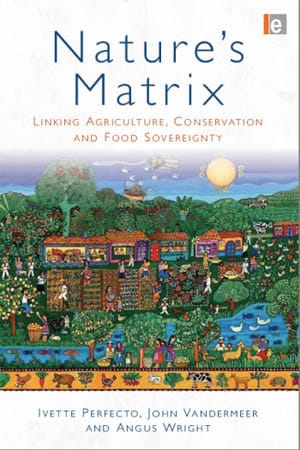food
Hurricane Sandy is another blow to Haiti

Farmers in Haiti. Photo by Elizabeth Whelan.
By Roger Annis
November 10, 2012 -- Rabble, posted at Links International Journal of Socialist Renewal with Roger Annis's permission -- Hurricane Sandy struck another heavy blow to Haiti on October 23, 24, 2012. At least 54 people died and dozens more are missing. Several tens of thousands of people were flooded out of their homes or earthquake survivor camps.
There are some 370,000 people stuck in appalling conditions in the camps while hundreds of thousands more have gone back to damaged homes or whatever other inadequate shelter they can find.
Most media reports focused almost entirely on the storm's impact on the United States, while mostly ignoring its severe consequences in the Caribbean.
Media reports, and doesn’t report, on Sandy in Haiti
Land grabbing: A new colonialism

A nascent oil palm plantation in southeastern Sierra Leone owed by Socfin Agriculture Company, which in March 2011 signed a 50-year lease with the government of Serra Leone. Photo by Felicity Thompson/IRIN.
By Alan Broughton
November 6, 2012 – Links International Journal of Socialist Renewal -- Since the global financial crisis of 2008 and its associated food crisis that sent another 200 million people into malnutrition, there has been a massive grab for land by large corporations around the world. Worst hit has been Africa, where food security is already non-existent for many people. Governments, including the Australian government, welcome this “investment” in agriculture, some bizarrely claiming that food security will be increased.
Nature’s matrix: Linking agriculture, conservation and food sovereignty

Nature's Matrix: Linking Agriculture, Conservation and Food Sovereignty
By Ivette Perfecto, John Vandermeer, and Angus Wright
Earthscan, 2009
Review by Ian Angus
October 17, 2012 -- Climate and Capitalism, posted at Links International Journal of Socialist Renewal with permission -- In any discussion of biodiversity and species extinction, someone usually insists that overpopulation is the problem. More people equals more farms equals less wilderness equals more extinctions. Life is a zero-sum game: you can have people and farming OR wildlife and biodiversity, but not both.

Rio de Janeiro, June 14, 2012 -- La Via Campesina -- About 3000 people from around the world will mobilise to say NO to the commodification of life and nature at the "Peoples Summit for Social and Environmental Justice and in Defense of the Commons", the parallel opposition activity to the UN Conference on Sustainable Development or Rio+20.
The peoples' summit is a space for discussion, debate and construction of alternative proposals by the global civil society, social movements and peoples collective organisations. La Via Campesina -- the international organisation of small farmers -- has been actively participating in the construction of this activity in order to denounce the false solutions of the same failed economic model that are now being dressed in green under the name “green economy”. La Via Campesina is instead promoting peasants' sustainable agriculture as a true solution to the global climatic and environmental crises.
The paradox of Cuban agriculture

By Miguel A. Altieri and Fernando R. Funes-Monzote
Τι μπορεί να αναμένεται από τις συνομιλίες του Ντάρμπαν;

Νίμο Μπάσεϊ. Photo: Right Livelihood Award Foundation.

Indigenous peoples condemn climate talks fiasco and demand moratorium on REDD+
By the Global Justice Ecology Project
Latin America: Summit in Venezuela opens 'new phase in history'

By Federico Fuentes
December 3, 2011 -- Green Left Weekly/Links International Journal of Socialist Renewal -- A summit of huge importance was held in Venezuela on December 2-3, 2011. Two hundred years after Latin America’s independence fighters first raised the battle cry for a united Latin America, 33 heads of state from across the region came together to form the Community of Latin American and Caribbean States (CELAC).
For Latin America, the summit represented a further step away from its traditional role as the United States’ backyard and its emergence as a player in its own right in international politics.
The importance of this new institution in world politics cannot be overstated. The combined gross domestic product of the countries within CELAC make it the third-largest economic powerhouse in the world. It is also home to the world’s largest oil reserves and the first and third largest global producers of food and energy, respectively.
South Africa: Rural women demand action on climate change

[For more on the COP17 Durban climate talks, click HERE.]
Memorandum from the Rural Women's Assembly to the UNFCCC, the government of the Republic of South Africa and the governments of Africa
December 4, 2011 -- We the Rural Women's Assembly of Southern Africa, meeting in Durban on the event of the 17th Conference of Parties of the UNFCCC in Durban [COP17] from November 30 to December 5, 2011, demand that governments take the following immediate steps to address the clear and present danger posed to rural communities by the climate crisis.
1. A climate deal that will take meaningful steps to halt the climate crisis by cutting carbon emissions. Historical emitters who are responsible for 75% of greenhouse gases (GHGs) must face trade and investment sanctions if they refuse to cut emissions, particularly from African governments, as Africa has contributed least to climate change, but is the worst affected.
